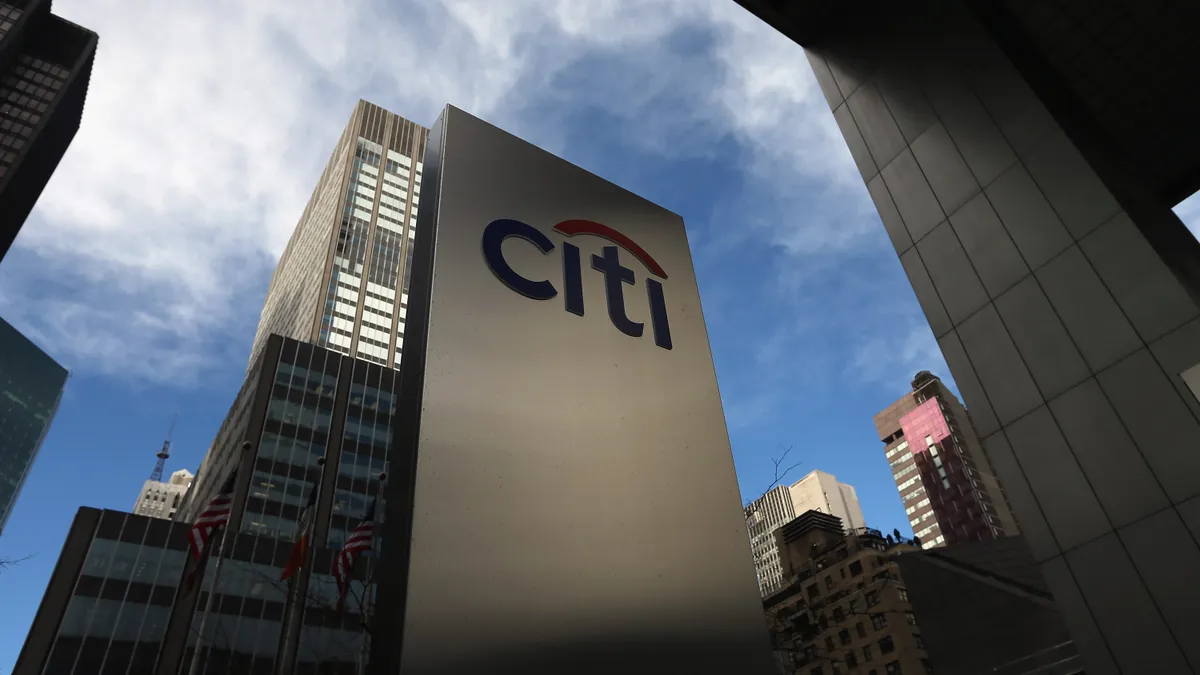Dive Brief:
- Citi executives aimed to shine a spotlight Tuesday on the bank’s services business — which CEO Jane Fraser has dubbed the lender’s “crown jewel” — during an investor presentation.
- One of Citi’s five businesses to emerge amid its sweeping revamp, the services unit includes liquidity management services, payments, trade and working capital solutions, and securities services. It was responsible for about half of the bank’s profit in the first quarter, and executives underscored the segment’s importance to the bank’s overall performance as Citi faces investor pressure to deliver on its turnaround plans.
- Still, the New York City-based bank projects revenue growth to slow for the business in the near term: Services is expected to generate low- to mid-single-digit annual revenue growth over the next couple of years, representing “a downshift from the past few years,” Piper Sandler analyst Scott Siefers said in a note to clients.
Dive Insight:
Executives repeatedly said the business, which helps about 19,000 clients around the world manage and move money, is at the heart of Citi’s strategy. The segment’s treasury and trade solutions “is frequently the front door to the rest of the firm for our middle market clients,” Fraser noted Tuesday.
Built over decades, the bank’s network has a footprint in 95 countries and moves close to $5 trillion for clients daily.
“We are determined to be the pre-eminent banking partner for institutions with cross-border needs,” Fraser said.
The event highlighting the services business and the investments being made to drive innovation comes amid Citi’s massive overhaul, which has included shedding thousands of jobs as part of a simplification in the bank’s structure, along with the exit of consumer businesses outside the U.S.
Shahmir Khaliq, Citi’s head of services, noted the business’s recent growth has been bolstered by a higher interest rate environment. Last year, services generated $18.1 billion in revenue, resulting in a 20% annual growth rate since 2021, he said.
The segment’s global network, allowing multinational business clients to handle cross-border transactions through one platform, is the foundation of the bank’s competitive advantage, Khaliq asserted. On top of that, the bank is focused on investing further to fuel innovation and integrating across product lines to make processes smoother for clients.
Citi put its wallet share for institutional clients of its treasury and trade solutions at 10%, above its peers, while its securities services market share is fourth, at 8.9%. The business is targeting opportunities to serve institutional clients looking to grow, he said, noting an increasing number of Asia-based customers seeking to enhance their footprints in the U.S. and Latin America. Citi is also betting it can deepen wallet share in sectors such as healthcare, technology and fintech, Khaliq said.
The business’s treasury and trade solutions market share among commercial clients is just 0.5%, however, and Citi plans to go after commercial clients with cross-border needs, Khaliq said. Given its relatively small market share in that segment, the bank will be heavily focused on multi-geography, multi-product clients in the next few years, he said.
“As rates begin to flatten out, my expectation is that we should be able to take even more share moving forward,” Khaliq said.
Khaliq noted the bank has fast-tracked some of the segment’s innovations in recent years. Citi has seen competition from and lost deals to fintechs in supply chain finance, he noted, sparking improvements to better compete.
Additionally, as Citi continues to make progress on its digital transformation, Fraser noted executives “recognize there are places where progress has been too slow.”
That’s led the bank to intensify some efforts, including regulatory reporting, data and strengthening the bank’s stress testing and resolution planning processes, CFO Mark Mason said. The Federal Deposit Insurance Corp. is set to downgrade its rating on the lender’s data management systems, The Wall Street Journal reported Monday.
“We will continue to be purposeful and disciplined about these investments across the franchise, and we are fully committed to spending what is necessary to meet our regulatory obligations,” Fraser said.













